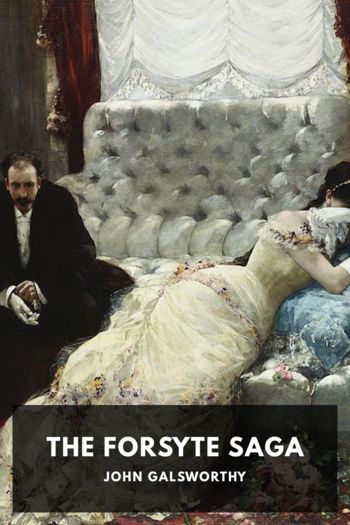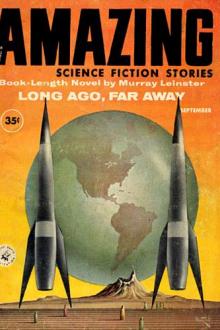The Forsyte Saga - John Galsworthy (best english novels for beginners .txt) 📗

- Author: John Galsworthy
Book online «The Forsyte Saga - John Galsworthy (best english novels for beginners .txt) 📗». Author John Galsworthy
“I saw you and that fellow in the Park.”
The sight of blood rushing into her cheeks gave him some satisfaction; she ought to be ashamed!
“Well?” she said.
Jolly was surprised; he had expected more, or less.
“Do you know,” he said weightily, “that he called me a pro-Boer last term? And I had to fight him.”
“Who won?”
Jolly wished to answer: “I should have,” but it seemed beneath him.
“Look here!” he said, “what’s the meaning of it? Without telling anybody!”
“Why should I? Dad isn’t here; why shouldn’t I ride with him?”
“You’ve got me to ride with. I think he’s an awful young rotter.”
Holly went pale with anger.
“He isn’t. It’s your own fault for not liking him.”
And slipping past her brother she went out, leaving him staring at the bronze Venus sitting on a tortoise, which had been shielded from him so far by his sister’s dark head under her soft felt riding hat. He felt queerly disturbed, shaken to his young foundations. A lifelong domination lay shattered round his feet. He went up to the Venus and mechanically inspected the tortoise.
Why didn’t he like Val Dartie? He could not tell. Ignorant of family history, barely aware of that vague feud which had started thirteen years before with Bosinney’s defection from June in favour of Soames’ wife, knowing really almost nothing about Val he was at sea. He just did dislike him. The question, however, was: What should he do? Val Dartie, it was true, was a second-cousin, but it was not the thing for Holly to go about with him. And yet to “tell” of what he had chanced on was against his creed. In this dilemma he went and sat in the old leather chair and crossed his legs. It grew dark while he sat there staring out through the long window at the old oak-tree, ample yet bare of leaves, becoming slowly just a shape of deeper dark printed on the dusk.
“Grandfather!” he thought without sequence, and took out his watch. He could not see the hands, but he set the repeater going. “Five o’clock!” His grandfather’s first gold hunter watch, butter-smooth with age—all the milling worn from it, and dented with the mark of many a fall. The chime was like a little voice from out of that golden age, when they first came from St. John’s Wood, London, to this house—came driving with grandfather in his carriage, and almost instantly took to the trees. Trees to climb, and grandfather watering the geranium-beds below! What was to be done? Tell Dad he must come home? Confide in June?—only she was so—so sudden! Do nothing and trust to luck? After all, the Vac. would soon be over. Go up and see Val and warn him off? But how get his address? Holly wouldn’t give it him! A maze of paths, a cloud of possibilities! He lit a cigarette. When he had smoked it halfway through his brow relaxed, almost as if some thin old hand had been passed gently over it; and in his ear something seemed to whisper: “Do nothing; be nice to Holly, be nice to her, my dear!” And Jolly heaved a sigh of contentment, blowing smoke through his nostrils. …
But up in her room, divested of her habit, Holly was still frowning. “He is not—he is not!” were the words which kept forming on her lips.
VI Jolyon in Two MindsA little private hotel over a well-known restaurant near the Gare St. Lazare was Jolyon’s haunt in Paris. He hated his fellow Forsytes abroad—vapid as fish out of water in their well-trodden runs, the Opera, Rue de Rivoli, and Moulin Rouge. Their air of having come because they wanted to be somewhere else as soon as possible annoyed him. But no other Forsyte came near this haunt, where he had a wood fire in his bedroom and the coffee was excellent. Paris was always to him more attractive in winter. The acrid savour from woodsmoke and chestnut-roasting braziers, the sharpness of the wintry sunshine on bright rays, the open cafés defying keen-aired winter, the self-contained brisk boulevard crowds, all informed him that in winter Paris possessed a soul which, like a migrant bird, in high summer flew away.
He spoke French well, had some friends, knew little places where pleasant dishes could be met with, queer types observed. He felt philosophic in Paris, the edge of irony sharpened; life took on a subtle, purposeless meaning, became a bunch of flavours tasted, a darkness shot with shifting gleams of light.
When in the first week of December he decided to go to Paris, he was far from admitting that Irene’s presence was influencing him. He had not been there two days before he owned that the wish to see her had been more than half the reason. In England one did not admit what was natural. He had thought it might be well to speak to her about the letting of her flat and other matters, but in Paris he at once knew better. There was a glamour over the city. On the third day he wrote to her, and received an answer which procured him a pleasurable shiver of the nerves:
“My Dear Jolyon,
“It will be a happiness for me to see you.
“Irene.”
He took his way to her hotel on a bright day with a feeling such as he had often had going to visit an adored picture. No woman, so far as he remembered, had ever inspired in him this special sensuous and yet impersonal sensation. He was going to





Comments (0)